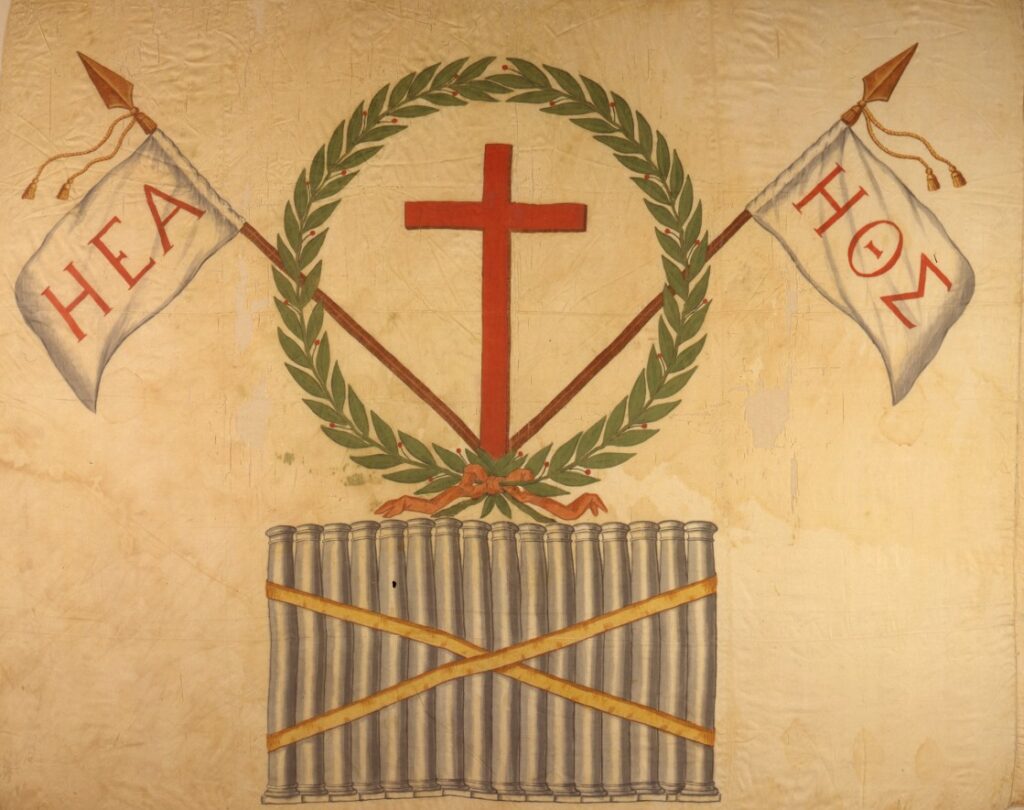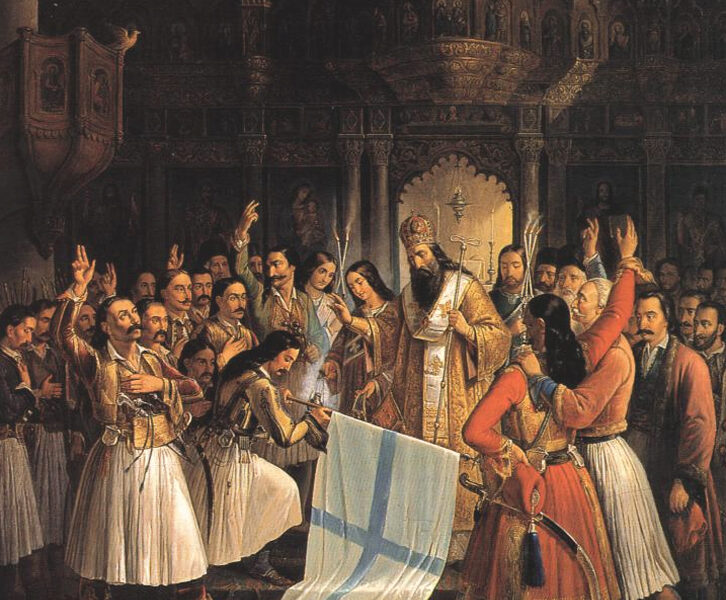
Anti-violence discourse abounds in public talk about Orthodoxy – and faith in general, for that matter. The argument seems to be quite straightforward: since (the Orthodox) faith is all about peace, the faithful cannot but be totally disassociated from every kind of violence. In reality, of course, nothing could be further than the truth. The question, though, is which truth are we interested in, historical truth or the truth of faith as such? But is such a distinction even valid in the first place? Yes, and no! Yes, because lots of things have happened and will keep on happening in history that are a disgrace to faith; and, no, because the truth, that is, the authenticity of faith is what it is only in, through and as history.
The historicity of Orthodoxy includes an array of manifestations of violence, from what we would call nowadays ‘cultural wars’ to revolutions to full-blown warfare. And I am not referring to those instances that have been utterly rejected as abominations, but to events celebrated and memorialised in the liturgical, hagiographical and more generally traditional legacy of the Orthodox Church: attacks against pagan shrines, revolts for the sake of justice, wars to regain holy relics or holy lands. It would be easy, all too easy, to bypass the whole issue by claiming that the pious generations of the past made a dire mistake… but the ‘mistake’ has been living on and on…
Especially nowadays, everything that is connected to violence poses a serious problem to the consciousness of a Christian; and when it comes from the past, the so much cherished past of tradition, it simply constitutes a scandal – both in the moral and the religious sense of the word! Nevertheless, perhaps we should reconsider the way in which we think about the Orthodox faith. More specifically, the latter is not an ideology, a metaphysical or ethical system of thought to be judged on the basis of its consistency or not with this or that fundamental principle. On the contrary, the Orthodox faith is a historically constituted and historically evolving life of thinking and practicing in accordance with the intention of Jesus Christ. And this intention is anything but clear-cut or given…
Is An Orthodox Theology of Revolution Possible?
In the Greek Orthodox Church there is a revolution that holds a sacred place in the minds and hearts of the faithful –at least for the vast majority of them until quite recently. The 1821 Revolution or the War of Independence, as it is alternatively known, is undoubtedly the closest that the Orthodox Church has ever come to acknowledging the conditions of possibility for the articulation of a ‘theology of revolution’; but it has stopped short… One wonders why; especially given the emblematic way in which this revolution has been linked to the Annunciation of the Theotokos and invested with the aura of sacredness in terms of its inspiration, aspirations and purpose. But even without supplying the materials for an Orthodox ‘theology of revolution’, the fact remains that the liturgically celebrated 1821 Revolution is anything but devoid of violence.
My contention is that an Orthodox ‘theology of revolution’ is not theoretically possible, but practically feasible. This sounds paradoxical – and most likely it is – but I will try to clarify. The very fact that in the life of Jesus Christ and the first disciples a revolution against the Roman Imperium was not promulgated as an option of godly action implies that there is no basis for the articulation of a theory that could justify theologically revolution as such. However, in the subsequent tradition of the Church, especially in the case of Orthodox peoples revolting against oppressive regimes, revolution has been regarded as the only practical alternative under certain conditions in order to fulfil the commandment of love.
In other words, what does not allow for a consistent and fixed theory for all circumstances may allow for the realisation of a behaviour and stance in real life when circumstances demand it. Sometimes our faithfulness to the intention of Jesus Christ requires that we abstain from the violence of revolution and war, and sometimes it is this very faithfulness that demands that we fight and have recourse to violence in order to be(come) His true disciples. Nothing in Christian life is fixed, closed and changeless; everything gets contextualised and is a kind of situationist calling and challenge that requires innovation, boldness, risk and responsibility. Although a Christian is not to develop a revolutionist mentality, they may well have to start a revolution – even if this means disregarding the possibility of eternal damnation – whenever love for the dignity of people compels them to do so!

Not All Violence Is the Same!
In the Orthodox world wars of independence have been accommodated, cherished and even celebrated. But if this is the case with a war of independence, couldn’t it be the same with a revolution for the sake of justice? Is independence more sacred or more Orthodox-friendly as an ideal than justice or even – in our times – fundamental human rights? An affirmative answer would be very difficult to sustain. As everyone can understand, what is defined as violence is in itself a debatable issue; an issue mainly dependent on whether or not ‘violence’ can be a means that serves a higher purpose in a given situation. For instance, in the case of the 1821 Revolution freedom was regarded as the highest possible goal in human life – even if it required sacrificing one’s own life. But how could taking someone else’s life be justified?
To be honest, taking someone else’s life in the cases of violence I have mentioned has never been the crux of the matter. The violence of war or revolution, for whatever reason, belongs to the condition of the fallen human nature and it is always a proof of how corrupt we are as beings-without-God. The crux of the matter has rather been the opposition to forms of life that go against what can be envisaged as desirable with regards to human relations in light of the Kingdom of God. To term it differently, violence properly speaking is anything that creates conditions that cannot be thought of as an anticipation of the Kingdom of God, whereas anything that uses violence against these conditions is – to use the antinomic way of saying things in theology – the non-violent violence of restoring humanity’s proper dignity.
It is extremely important to remember and celebrate anniversaries such as the Greek Revolution of 25 March 1821, for it puts forward the responsibility of faithfulness that the Orthodox people should always exhibit in the changing conditions of history. The Greek fighters of freedom were not deluding themselves by following some ideological agenda or philosophical premises; they were risking everything they could possibly hope for through their determination to remain faithful to their Lord – and this they did by not following in His footsteps! There is a time for peace, and there is a time for violence; in any case what really matters is that one’s faithfulness to the intention of Jesus’ love remains the guiding light of their life; a light that will shine even when all other lights have gone out…
ABOUT | INSIGHTS INTO GLOBAL ORTHODOXY with Dr Vassilis Adrahtas
"Insights into Global Orthodoxy" is a weekly column that features opinion articles that on the one hand capture the pulse of global Orthodoxy from the perspective of local sensitivities, needs and/or limitations, and on the other hand delve into the local pragmatics and significance of Orthodoxy in light of global trends and prerogatives.
Dr Vassilis Adrahtas holds a PhD in Studies in Religion (USyd) and a PhD in the Sociology of Religion (Panteion). He has taught at several universities in Australia and overseas. Since 2015 he has been teaching ancient Greek Religion and Myth at the University of New South Wales and Islamic Studies at Western Sydney University. He has published ten books. He has extensive experience in the print media as editor-in-chief, and columnist, and for a while he worked as a radio producer. He lives in Sydney, Australia, his birthplace.

